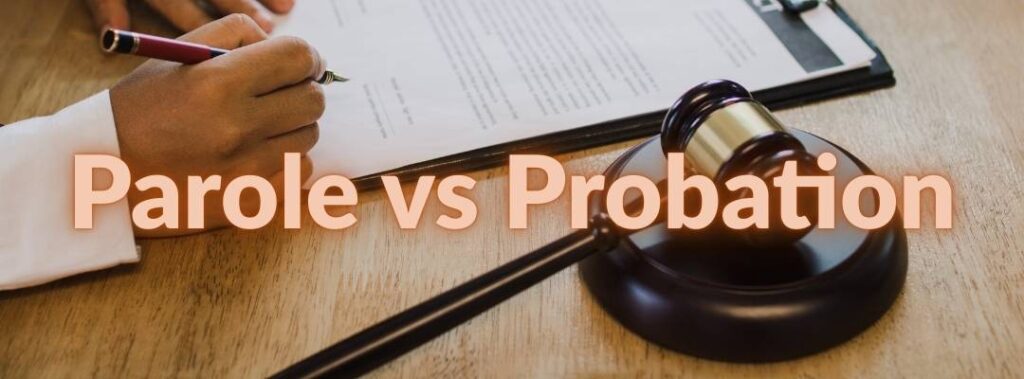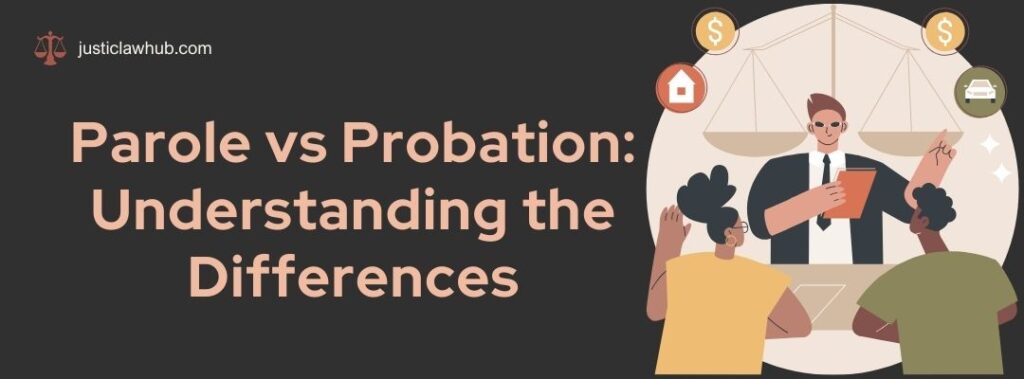When it comes to the criminal justice system, the terms parole and probation are often used interchangeably. However, they are distinctly different legal concepts, each with its own rules, purposes, and consequences. Understanding the distinction between parole vs probation is crucial, especially for individuals involved in the system, their families, or anyone interested in criminal law.
In this article, we’ll explore everything you need to know about probation vs parole, the roles of parole officers vs probation officers, and how these systems impact offenders and society.

What is Probation?
Probation is a type of criminal sentence that allows an offender to remain in the community under supervision instead of serving time in prison. Essentially, the court gives the offender a chance to demonstrate good behavior while avoiding incarceration.
Probation is usually offered for less severe crimes, especially for first-time offenders. While on probation, the individual must comply with specific conditions set by the court. These conditions often include regular check-ins with a probation officer, staying employed, attending counseling or rehabilitation programs, avoiding criminal activity, and refraining from drug or alcohol use.
Violating probation can lead to severe consequences, including serving the original prison sentence, so it’s a serious commitment.
What is Parole?
Parole, on the other hand, applies to individuals who have already served time in prison. It is a conditional release that allows inmates to reintegrate into society under supervision before completing their full sentence.
The goal of parole is to encourage rehabilitation and reduce the likelihood of reoffending. Just like probation, parole comes with rules and restrictions. A parole officer monitors the parolee to ensure compliance with these conditions, which may include regular meetings, drug tests, and restrictions on travel or association with certain individuals.
In short, while probation occurs instead of prison, parole occurs after serving part of a prison sentence.
Related Post: LAWA Login: Complete Guide to Access Los Angeles World Airports Portal
Probation vs Parole: Key Differences
Understanding the distinction between probation vs parole can be tricky, but there are several key differences:
- Timing: Probation is given instead of incarceration, whereas parole is granted after part of a prison sentence has been served.
- Authority: Probation is ordered by a judge during sentencing, while parole is granted by a parole board or similar authority after an inmate has served time.
- Supervision: Both involve supervision, but a probation officer monitors probationers from the outset, while a parole officer supervises after prison.
- Purpose: Probation aims to prevent incarceration and give offenders a chance to correct behavior, while parole focuses on reintegration and reducing recidivism.
These differences are critical for anyone navigating the criminal justice system, as the rules and consequences differ significantly depending on whether someone is on probation or parole.
Parole Officer vs Probation Officer: Who Does What?
A common question is: what is the difference between a parole officer vs probation officer? Both roles are vital in the criminal justice system, but they serve different functions.
Probation Officer
A probation officer works directly under the court system to supervise offenders who have been sentenced to probation. Their responsibilities include:
- Conducting regular check-ins with probationers
- Monitoring compliance with court-ordered conditions
- Preparing reports for the court on the offender’s progress
- Providing guidance and resources to help probationers reintegrate into society
Probation officers are essentially the eyes and ears of the court, ensuring that offenders adhere to the rules and offering support to prevent recidivism.
Parole Officer
A parole officer supervises individuals who have been released from prison on parole. Their duties often involve:
- Monitoring parolees for compliance with release conditions
- Conducting home visits and drug tests
- Helping parolees find employment or housing
- Reporting violations to the parole board, which can result in reincarceration
While the roles overlap in supervision, parole officers vs probation officers differ mainly in timing and authority. Probation officers are court-based, whereas parole officers operate under the parole board or correctional system.
Parole vs Probation Officer: Understanding the Relationship
Sometimes, people confuse the terms parole vs probation officer, but the distinction is important. The primary difference lies in who they supervise and under what authority.
- A probation officer supervises someone who has never been to prison or is serving a sentence in the community instead of jail.
- A parole officer supervises someone who has been released from prison early under specific conditions.
Both roles require a combination of law enforcement skills and social work expertise, as officers often guide offenders through rehabilitation and reintegration.
Common Conditions of Probation
Probation conditions vary depending on the offense and the jurisdiction, but some common requirements include:
- Reporting regularly to a probation officer
- Attending counseling or rehabilitation programs
- Maintaining employment or pursuing education
- Paying fines or restitution
- Avoiding criminal activity and prohibited areas
Violation of any condition can result in probation being revoked, leading to imprisonment.
Common Conditions of Parole
Parole conditions are similarly strict, given that the parolee has already served time in prison. Typical conditions include:
- Meeting regularly with a parole officer
- Reporting changes in residence or employment
- Abstaining from drugs and alcohol
- Avoiding contact with criminal associates
- Submitting to random searches or drug testing
Failure to comply can result in a parole violation, and the individual may be returned to prison to serve the remainder of their sentence.
Parole vs. Probation: Pros and Cons
Both parole and probation have advantages and drawbacks. Understanding these can help individuals make informed decisions if offered probation or prepare for parole.
Pros of Probation
- Avoids incarceration and maintains community ties
- Allows the offender to continue working or attending school
- Reduces prison overcrowding
- Offers access to rehabilitation programs
Cons of Probation
- Strict supervision and frequent reporting
- Risk of incarceration if conditions are violated
- Social stigma and legal restrictions
- Financial obligations such as fees or fines
Pros of Parole
- Provides early release from prison
- Offers support for reintegration into society
- Encourages rehabilitation and reduces recidivism
- Allows individuals to reunite with family
Cons of Parole
- Continuous supervision and potential privacy limitations
- High risk of reincarceration for minor violations
- Limited freedom compared to probation
- Employment and housing restrictions
Probation vs Parole: Misconceptions
There are several misconceptions about parole vs probation that can confuse people:
- “Parole is easier than probation.” Not true—both come with strict rules, and parole violations can result in returning to prison.
- “Probation is only for minor crimes.” While often used for less severe offenses, probation can apply to serious crimes depending on circumstances.
- “Parole means freedom.” Parole is still conditional; the parolee is not fully free until the end of the sentence.
- “Probation and parole officers are interchangeable.” Each has unique responsibilities and authority.
Understanding these distinctions is crucial for avoiding mistakes and complying with legal requirements.
Legal Rights of Probationers and Parolees
Both probationers and parolees have legal rights. These include the right to due process if accused of violating conditions, access to legal representation, and the right to appeal certain decisions.
However, these rights come with limitations. For instance, both probationers and parolees may be subject to searches without a warrant, restricted travel, and other conditions that would not apply to ordinary citizens.
Conclusion
Understanding the difference between parole vs probation, as well as the roles of parole officers vs probation officers, is essential for anyone navigating the criminal justice system. Probation allows offenders to remain in the community under supervision instead of serving time, while parole offers a conditional release for those who have already served part of a prison sentence.
Both systems aim to rehabilitate offenders, reduce recidivism, and maintain public safety, but they operate in distinct ways. Awareness of the rules, conditions, and responsibilities can make a significant difference for individuals, their families, and the broader community.



